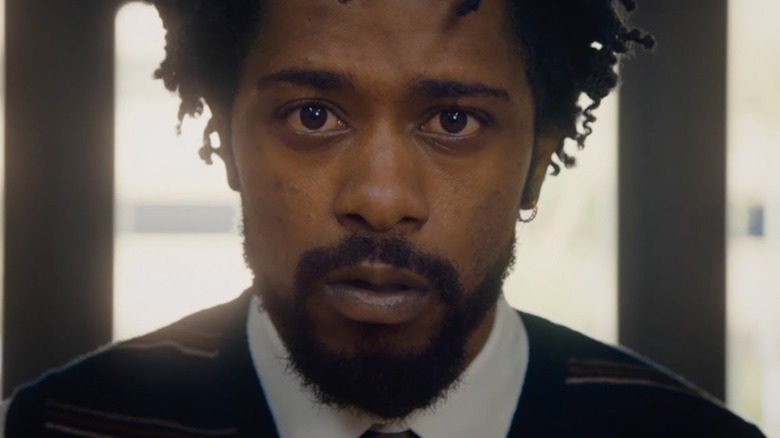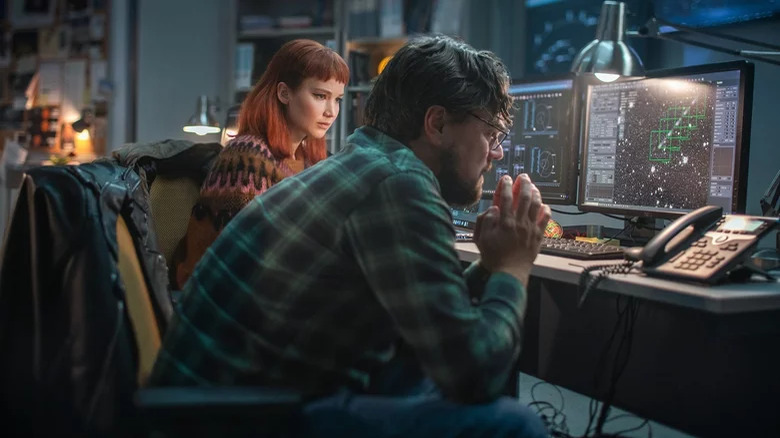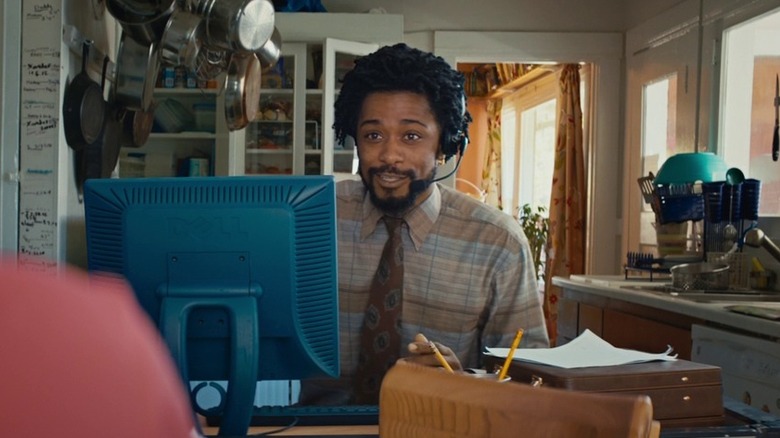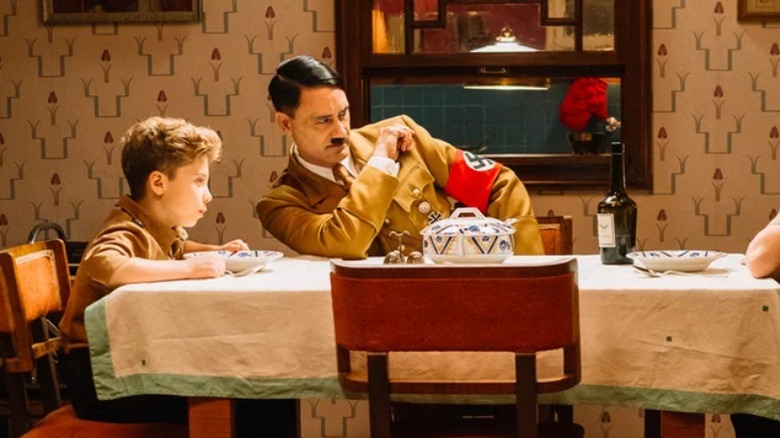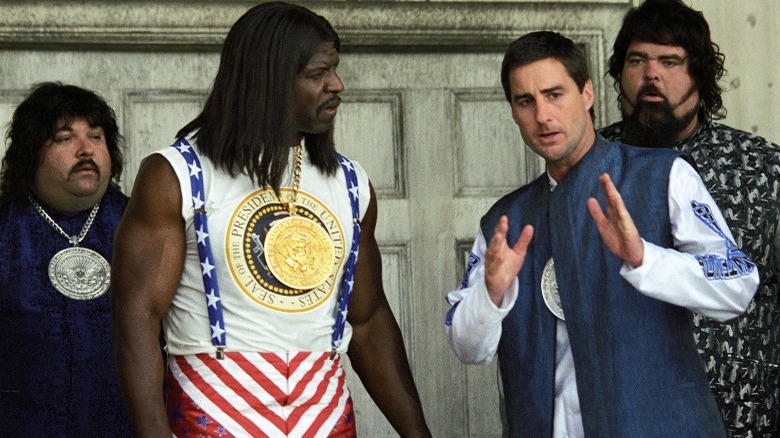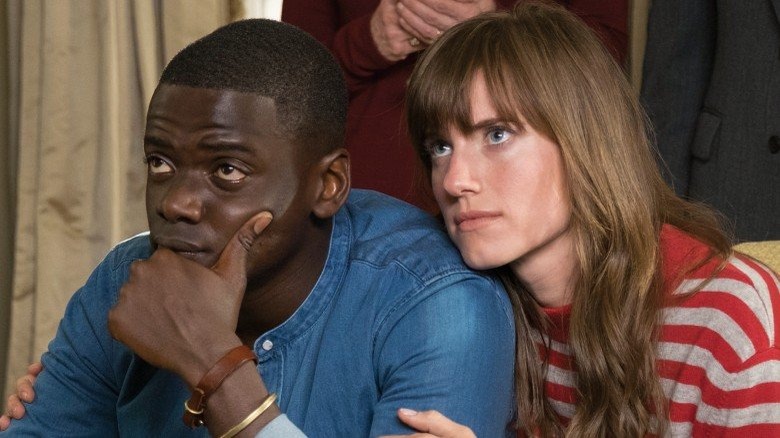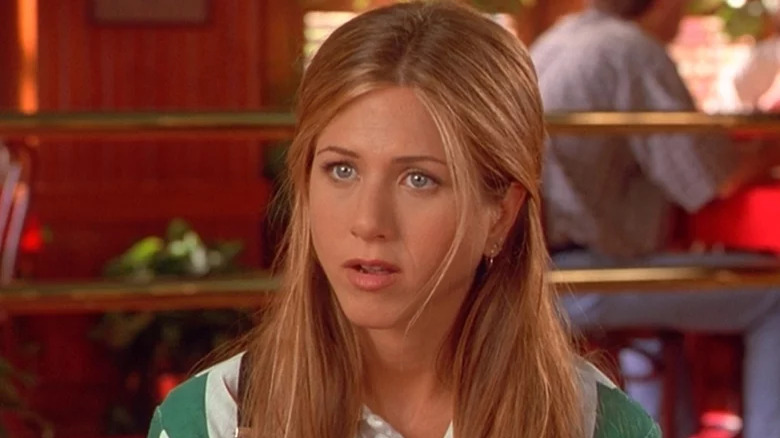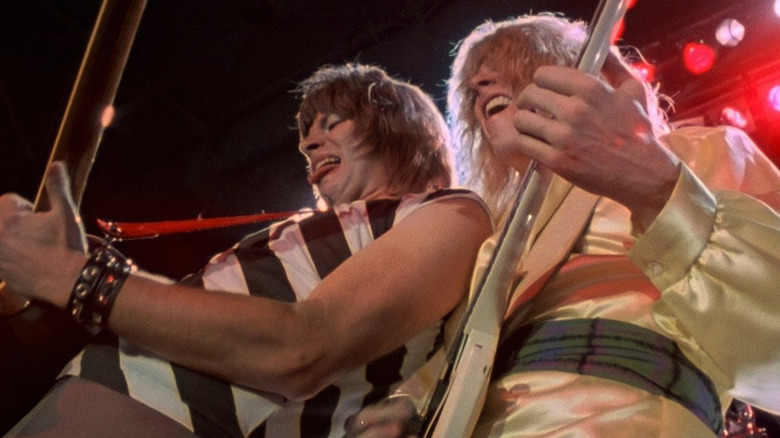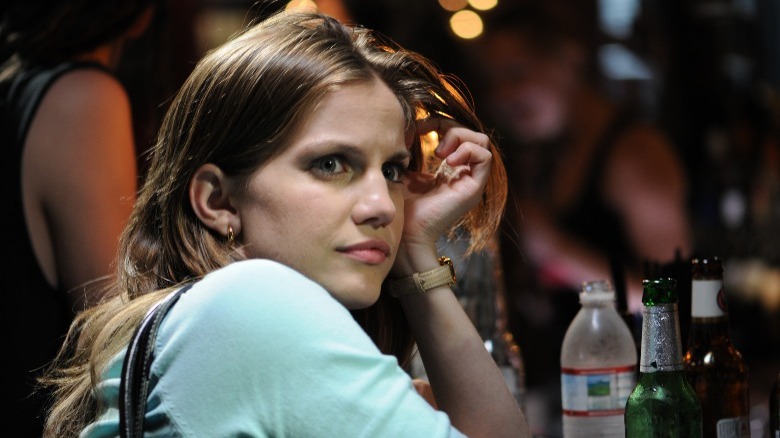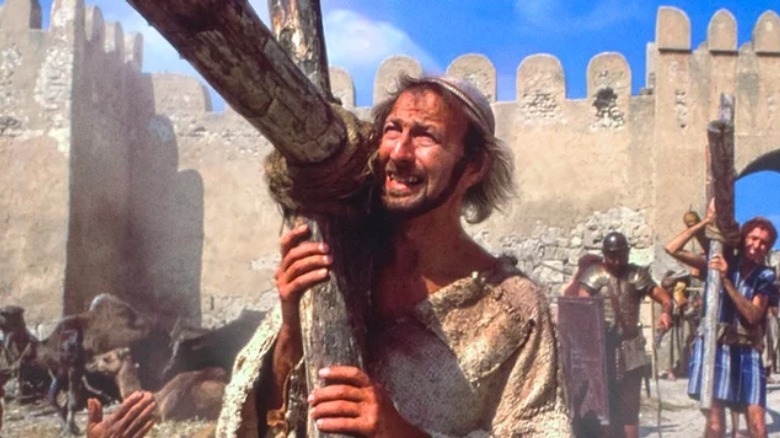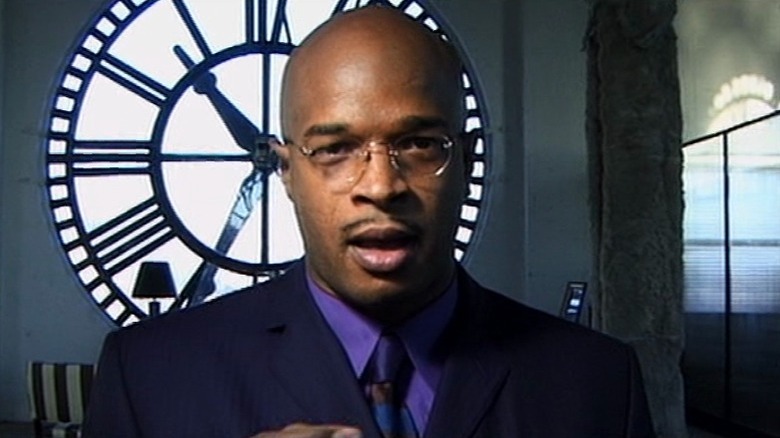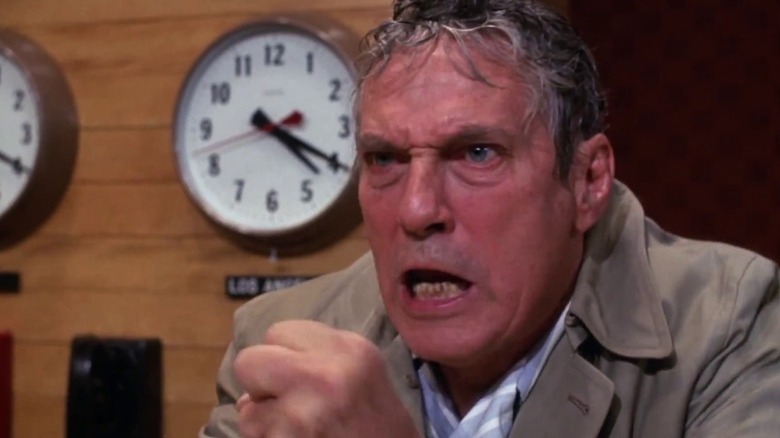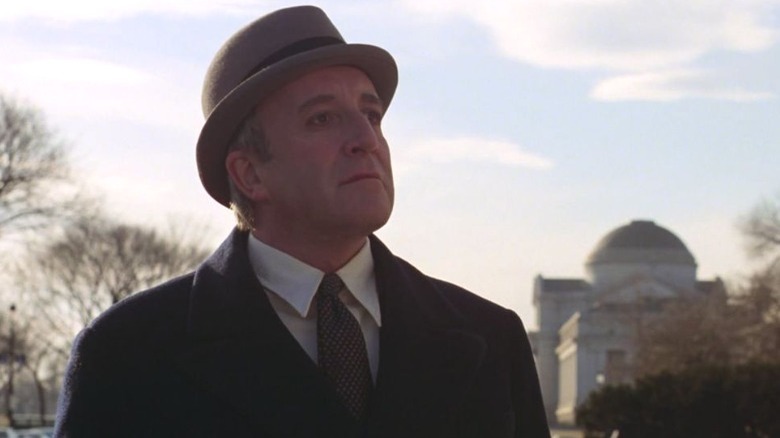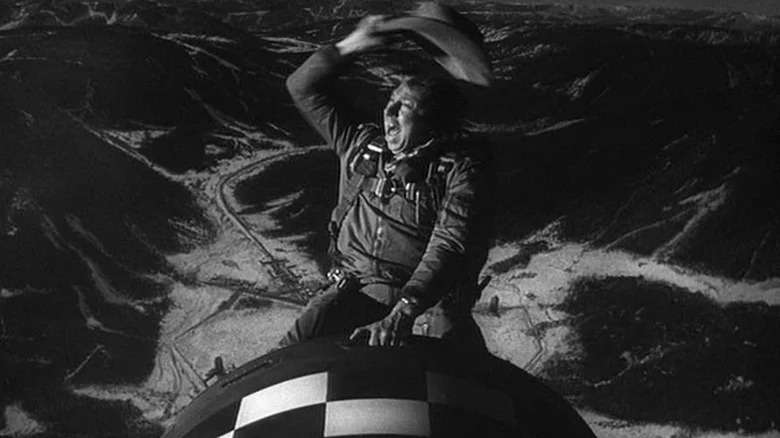The Best Satire Movies Of All Time Ranked
Many great satires stand among the best comedy movies of all time. But what is a satire? A satire exaggerates the world we live in, essentially holding up a funhouse mirror to our daily frustrations and injustices. This sets satire apart in the wider world of comedy. Most comedies want you to have a fun time, but satire can leave you anywhere from breathing a sigh of relief to teeming with rage. They can be arch and subtle, or so hyperbolic they practically yell in your face. At its best, the genre is cutting, transformative, and deeply relevant.
Though some satire predicts the future, they mostly tell stories about the present. How did we get here, they ponder, sorted into these countries and workplaces, staring at all of these screens? The more that modern life begins to feel like a parody, the more satire means to us. We're here to take a look at those movies that find a loose thread in reality and pull with both hands. They're all deeply funny, of course, but they also function as sharp editorial takes on life that have all aged remarkably well. These are the best satire movies of all time, ranked.
14. Don't Look Up
Writer-director Adam McKay started in broad comedy (although "Anchorman" is, in part, an effective satire of masculinity) before moving onto the tongue-in-cheek docudrama of "The Big Short" and "Vice." With 2021's "Don't Look Up," he moved into full-blown satire by making the most high-profile "asteroid headed for Earth" movie since 1998's "Deep Impact" and "Armageddon." But instead of the measured and calm governmental response seen in "Deep Impact" or even the bombastic heroic space mission of "Armageddon," "Don't Look Up" sees the world rapidly devolve into a chaos that feels all too familiar.
In McKay's vivid farce, a significant portion of the population refuses to even look for the asteroid, believing it to be a hoax after watching too many YouTube videos. Private money further corrupts the attempt to save humanity: Instead of a mission to destroy the asteroid, a tech mogul convinces the government to try and harvest it for minerals instead. Our heroic scientists are ignored by the government or corrupted by media attention, and the whole thing barrels toward an ending that feels as inevitable as climate change. "Don't Look Up" is a rallying cry to a world with its collective head in the sand.
13. Sorry to Bother You
"Sorry to Bother You," Boots Riley's feature-length directorial debut, has an apparently simple hook. Cash Green (Lakeith Stanfield) struggles to get by, until he gets a job as a telemarketer. His coworker advises him to use a "white voice" when talking to customers, which is provided by David Cross. Cash immediately begins to succeed well beyond expectations. This idea plays with so many deep ideas about race, speech, and vocabulary, it could fill a movie on its own. But "Sorry to Bother You" is barely getting started.
We quickly learn that Cash's new company also manages weapons deals, and is a subsidiary of an Amazon-like company called WorryFree, which signs people into a kind of indentured servitude. His coworkers form a union and begin protesting, but these protests quickly become indistinguishable from the confusing performance art shows Cash's girlfriend Detroit (Tessa Thompson) puts on. Before you know it, like a Thomas Pynchon novel on overdrive, "Sorry To Bother You" introduces half-horse, half-human hybrids and the wider collapse of society. "Sorry To Bother You" is a blistering ode to the cacophony and instant commodification of the digital age.
12. Jojo Rabbit
There may be no more likable modern performer than Taika Waititi. He's a pure delight as Korg in the Marvel Cinematic Universe, and as a vampire in the original "What We Do In The Shadows." His directorial projects carry the same warm-hearted tone. Casting himself as Hitler, then, is a brilliant satirical act unto itself. In the Oscar-winning "Jojo Rabbit," Waititi plays the dictator as a fantastical imaginary friend to title character Jojo (Roman Griffin Davis), a 10-year-old boy and ardent member of the Hitler Youth. After decades of World War II movies, "Jojo Rabbit" somehow manages to find a new and whimsical take on well-trod ground through the simple and elegant device of Waititi's Hitler.
The story, wherein Jojo comes to befriend a Jewish girl (Thomasin McKenzie) whom his mother is hiding in their home, follows a predictable enough path. But "Jojo Rabbit" takes some surprising twists and gets to a genuinely emotional place. The pure silliness of Waititi's goofy take on Hitler lulls you into a false sense of security so the movie can break your heart all the easier. And boy, does it break your heart — in between inducing belly laughs.
11. Ingrid Goes West
The titular Ingrid of "Ingrid Goes West" isn't just one of Aubrey Plaza's best movie roles, it may be the role she was born to play. She's progressed from the deadpan snark of April on "Parks and Recreation" to intensely dark movie roles, and is a perennial fascination on social media. Naturally, she's a perfect choice to play a character hopelessly addicted to all things online.
Ingrid is a troubled young woman with a recent inheritance and far too much time on her hands. She channels all of it into stalking Taylor (Elizabeth Olsen), an Instagram personality with a sun-soaked and seemingly perfect life. Of course, this flawlessness is an illusion captured in Taylor's digitally-filtered squares and captions, which Ingrid starts to discover as she gets closer to her idol. "Ingrid Goes West" seems likely to stay timely, as it grounds itself in fantastic performances from Plaza and Olsen. It astutely captures the fine line between a life cultivated for online consumption and full-blown mental instability. What results is one of the best stories about smart phone addiction, influencer culture, and the allure of digital connection to hit the silver screen.
10. Idiocracy
"Idiocracy" is the kind of mid-'00s comedy that seemed hopelessly crass and cynical when it came out. But as the years fly by, it only becomes more and more plausible. Curiously, it's not the central premise of the movie that holds up. The idea that the population will get dumber because intelligent people choose not to have children isn't entirely true, as Bloomberg points out, and is a bit mean-spirited in itself. But the dystopian corporate future of "Idiocracy" often seems like where the world is headed. Will people really have first names like "Frito" and middle names like "Mountain Dew" in the future? It feels frighteningly possible.
Luke Wilson holds the movie together as the laconic straight man, an average Joe (whose name is, in fact, Joe) selected to be part of an experimental hibernation project. But he's accidentally left frozen for 500 years, rather than one. He wakes up in a world where everything is sponsored, information and instructions are dumbed-down into pictures and large buttons, and the president is a ridiculous charlatan who used to be a wrestler. As life began to resemble "Idiocracy" more and more, screenwriters Etan Cohen and Mike Judge discussed bringing back Terry Crews' President Camacho for some spoof commercials – an idea that Fox shot down, lest people assume they were spoofing a particular candidate in 2016.
9. Get Out
There's a moment near the end of Jordan Peele's "Get Out" that might be the most raw, gasp-inducing moment in cinema this century. Not to spoil it, but it arrives when main character Chris (Daniel Kaluuya), a young Black man trying to flee an insane body-snatching ring of rich white people, is suddenly bathed in red and blue flashing lights. Peele expertly brings in a real-world tension at this inopportune moment, shifting the movie's visceral fear and creeping dread into an even higher gear. It'll put you on the edge of your seat and linger long after the credits roll.
It helps that "Get Out" is also expertly crafted and paced, with plenty of comic relief thrown in. The movie deftly blends tones, starting out as a Hitchcock-esque psychological thriller before shifting into full "Twilight Zone" mode when the big twist is revealed. The film satirizes both the way Black people have been historically exploited in the United States, and the pernicious complacency of "progressive" white Americans. In the years since its release in 2017, "Get Out" has only become more and more relevant.
8. Office Space
Few films of the 1990s were as ahead of their time as "Office Space." Ostensibly a send-up of office life, it gets at the essential truth that haunts us more and more by the minute: Humans weren't meant to sit at desks and stare at screens all day. Ron Livingston puts his laconic everyman charm to perfect use as main character Peter, who, with the help of some well-timed hypnosis therapy, has an epiphany. It causes him to stop taking his job seriously, show up when he feels like it, and speak to his superiors without any filter.
Ironically, this earns him a promotion as a straight-shooter. By showing up with the full force of his personality, Peter instantly stands out in a world trying to deprive workers of their individuality. "Office Space" tells a breezy, entertaining story while also getting at essential questions about work-life balance, wider purpose, and human connection. Decades before the term "quiet quitting" was invented, Peter rebelled against his anonymous tech company, love interest Joanna (Jennifer Aniston) wore only the minimum pieces of flair, and Peter's coworkers cathartically destroyed a finicky printer.
7. This Is Spinal Tap
"This Is Spinal Tap" holds a legendary place in terms of modern satire: It essentially created the must-watch mockumentary as we know it. Co-writer Christopher Guest proceeded to hone the format with movies like "Waiting For Guffman," "Best in Show," and "A Mighty Wind." Later, Ricky Gervais and his American counterparts made the mockumentary format a staple of television comedy with "The Office." It's no exaggeration to say that "This Is Spinal Tap" is the progenitor of the entire form.
Director Rob Reiner stars as fictional documentarian Marty Di Bergi, who's following the antics of the titular fake band. What ensues is a riotously funny satire of the perils of fame that brings entirely new life to the familiar beats of a major band's rise and fall. Set pieces go awry, a Yoko Ono-type girlfriend figure causes friction, and multiple drummers die in elaborate ways. If it wasn't composed of comedy legends like Harry Shearer, Michael McKean, and Guest himself, it would be easy to believe Spinal Tap was a real band — and therein lies the movie's power.
6. In The Loop
A masterpiece of political satire, "In The Loop" is a breathless farce about the 2003 run-up to the Iraq War. Director Armando Iannucci spun the idea off from his BBC show "The Thick of It," itself a brilliant work of political satire. In examining the confusing game of political telephone between Britain and America that led them into war, he paints a definitive portrait of the '00s news cycle.
One hapless British minister saying that war is "unforeseeable" snowballs into a maelstrom of corrections and over-corrections, until a report recommending against military intervention is doctored into a report in favor of it. With the same caustic, rapid-fire wit that he would go on to bring to "Veep," Iannucci skewers a political landscape that was full of posturing and blundering when the movie came out in 2009, and has only grown more cartoonish. Highlights from a stacked ensemble cast include future "Doctor Who" star Peter Capaldi, Anna Chlumsky as a high-strung lackey (much like her later role on "Veep"), and the late, great James Gandolfini.
5. Monty Python's Life of Brian
In one of the most daring satires of all time, Monty Python brings all the irreverence and silliness of "Monty Python and the Holy Grail" to the story of Jesus Christ in "Monty Python's Life of Brian." After taking on Arthurian legend, the legendary comedy group lampoons the entire New Testament by telling the story of Brian (Graham Chapman), a young man of Nazareth who has the bad luck to be born next door to Jesus and is mistaken for the Messiah in increasingly hilarious ways.
"Life of Brian" has all the wordplay, tangents, and absurdity of Monty Python's other great work, but by virtue of its subject, it is by far their most subversive creation. At one point, Brian lectures an entire crowd that believes he's the savior, imploring them to think for themselves. But they merely repeat all of his words back to him as commandments, shouting, "We are all individuals!" as a thoughtless mass. Even when the real Jesus makes a cameo, Monty Python points out how easy it is to get his message mixed up: Onlookers in the very back think he's preaching, "Blessed are the Greek!"
4. Bamboozled
Of all his films, "Bamboozled" is Spike Lee as his most gloriously satirical. A blistering take on the premise of "The Producers," "Bamboozled" stars Damon Wayans as Pierre Delacroix, a television writer who keeps seeing his scripts for thoughtful, intelligent stories about Black Americans rejected. So, he attempts to get fired by pitching a modern-day minstrel show, complete with Black actors in blackface and absurdly stereotypical jokes. To his horror, the show is enthusiastically greenlit and becomes an immediate success. Pierre pivots to enjoying his new fame and fortune, and defending the minstrel show as satire.
Spike Lee amps up the plot to ridiculous proportions, but never lets go of the central question: How do you know what's satirical when you can't control what your audience is laughing at, or why? This question remains deeply important today, which "Bamboozled" makes intensely clear with a poignant montage of an entire century of supposed "comedy."
3. Network
"Network" was released in 1976, but the ensuing years have only proven it more and more right about the shameless lengths mass media will go to for attention. The story of Howard Beale (Peter Finch), a news anchor who snaps on-air and begins ranting about life, seems almost tame compared to the cable news talking heads and conspiracy theory-obsessed radio hosts of today. But the raw emotion of Finch's performance, which he won an Oscar for, shines as an eternal howl of frustration against the demands of the system. In his own immortal words, "I'm mad as hell, and I'm not going to take this anymore!"
The real strength of "Network" is in its depth, courtesy of Paddy Chayefsky's layered script. Amid all the absurd antics on television, a deep story about ethics, love, and changing times plays out, with William Holden and Faye Dunaway representing the old and new ways of producing TV respectively. As the events get more and more ridiculous, the stolen bits of passion and connection feel all the more real and precious.
2. Being There
The brilliance of Hal Ashby's "Being There" is that it executes a ridiculous premise — that a simple-minded gardener could accidentally rise to the top of political society — with subtlety and restraint. Even the casting of the dynamic and elastic Peter Sellers as Chance the gardener (misheard as "Chauncey Gardiner") is a masterstroke, as he delivers a soft performance that simultaneously brims with energy.
At first glance, "Being There" is a simple and entertaining story about how Chance leaves his secluded life of gardening and television-watching behind in favor of misadventures. But "Being There" is actually a thorough indictment of how easy it is for a white man with the trappings of wealth and the appearance of wisdom to fail upward in American society. Because of the way he dresses and talks, people mistake Chance for a member of the revered elite, and are inclined to interpret his frequent gardening metaphors as deep and valuable wisdom. Business and politics are skewered as insular echo chambers of foolish privilege in a way that remains sharply witty and deeply relevant.
1. Dr. Strangelove
The world has lived with an unbearable, impossible tension since nuclear weapons were developed. At any moment, one press of the button could end the world as we know it. "Dr. Strangelove or: How I Learned to Stop Worrying and Love the Bomb" is an indispensable cry of anguish regarding this absurd situation. One of the best films in Stanley Kubrick's excellent filmography, "Dr. Strangelove" is the pinnacle of satire. It's committed to a dry, slow-burning comic tension that rises to a crescendo just when the bombs finally go off.
The great Peter Sellers is the highlight of the cast in his signature triple role of Lionel Mandrake, Merkin Muffley, and Dr. Strangelove. He works brilliantly alongside George C. Scott as Buck Turgidson and James Earl Jones as Lothar Zogg. "Dr. Strangelove" is funny from scene to scene, with endlessly quotable dialogue and top-notch physical comedy. But it also tells one of the most important satirical stories of the past century. The world could end at any moment, even though the Cold War has come to an end. "Dr. Strangelove" reminds us to laugh in the face of this tension.
